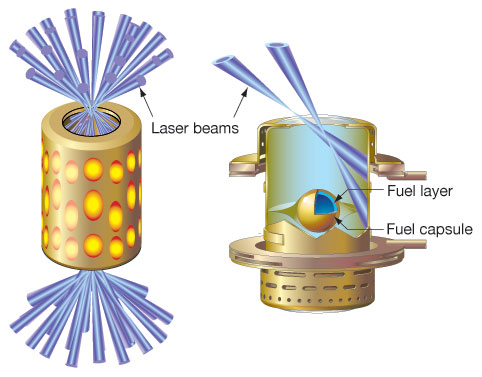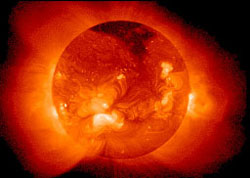Inertial Confinement Fusion:
How to Make a Star
The idea for the National Ignition Facility (NIF) grew out of the decades-long effort to generate fusion burn and gain in the laboratory. Current nuclear power plants, which use fission, or the splitting of atoms to produce energy, have been pumping out electric power for more than 50 years. But achieving nuclear fusion burn and gain has not yet been demonstrated to be viable for electricity production. For fusion burn and gain to occur, a special fuel consisting of the hydrogen isotopes deuterium and tritium must first "ignite." A primary goal for NIF is to achieve fusion ignition, in which more energy is generated from the reaction than went into creating it.
NIF was designed to produce extraordinarily high temperatures and pressures – tens of millions of degrees and pressures many billion times greater than Earth's atmosphere. These conditions currently exist only in the cores of stars and planets and in nuclear weapons. In a star, strong gravitational pressure sustains the fusion of hydrogen atoms. The light and warmth that we enjoy from the sun, a star 93 million miles away, are reminders of how well the fusion process works and the immense energy it creates.
Replicating the extreme conditions that foster the fusion process has been one of the most demanding scientific challenges of the last half-century. Physicists have pursued a variety of approaches to achieve nuclear fusion in the laboratory and to harness this potential source of unlimited energy for future power plants.
See How ICF Works for a more detailed description of inertial confinement fusion.
 All of the energy of NIF's 192 beams is directed inside a gold cylinder called a hohlraum, which is about the size of a dime. A tiny capsule inside the hohlraum contains atoms of deuterium (hydrogen with one neutron) and tritium (hydrogen with two neutrons) that fuel the ignition process.
All of the energy of NIF's 192 beams is directed inside a gold cylinder called a hohlraum, which is about the size of a dime. A tiny capsule inside the hohlraum contains atoms of deuterium (hydrogen with one neutron) and tritium (hydrogen with two neutrons) that fuel the ignition process.


